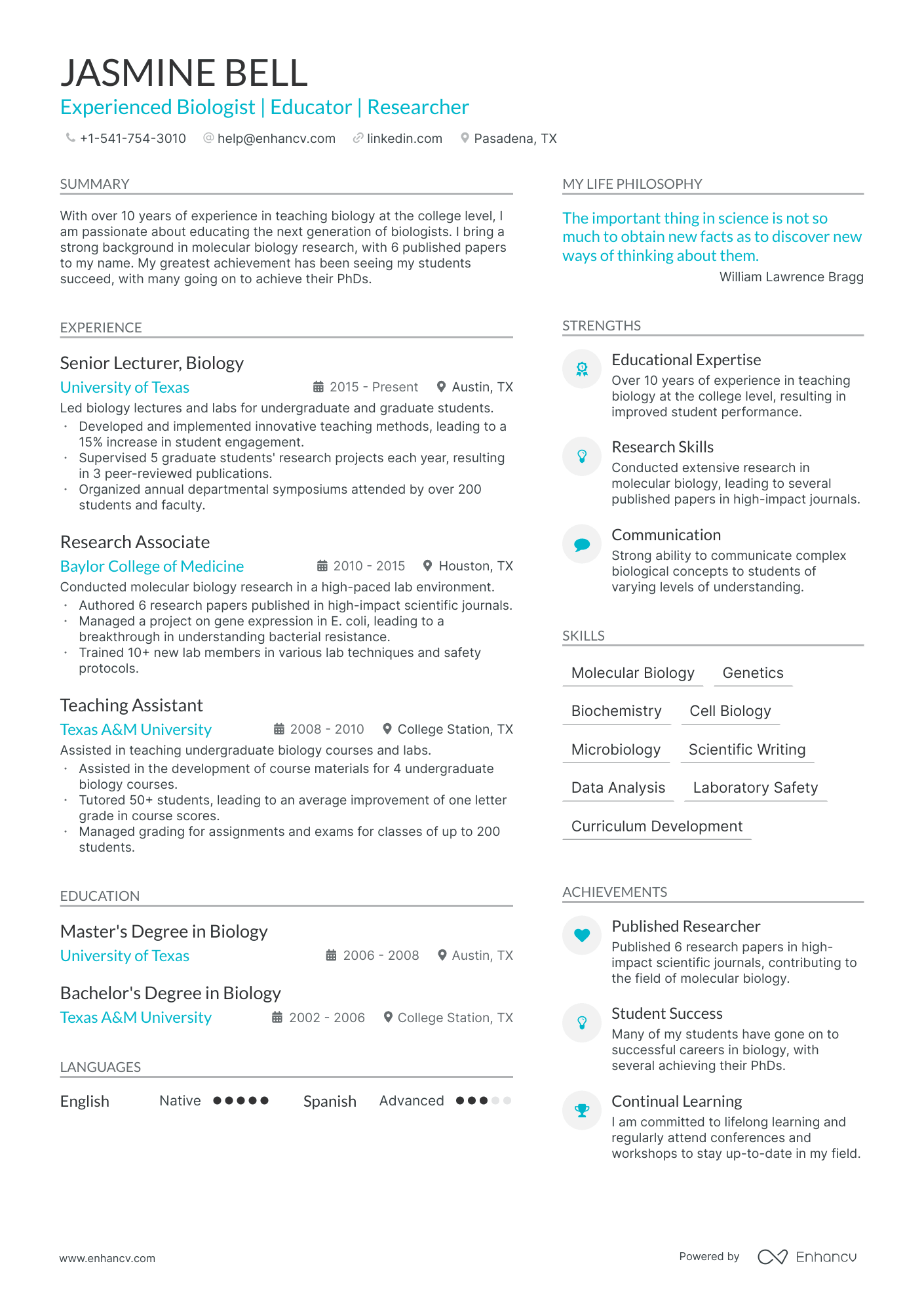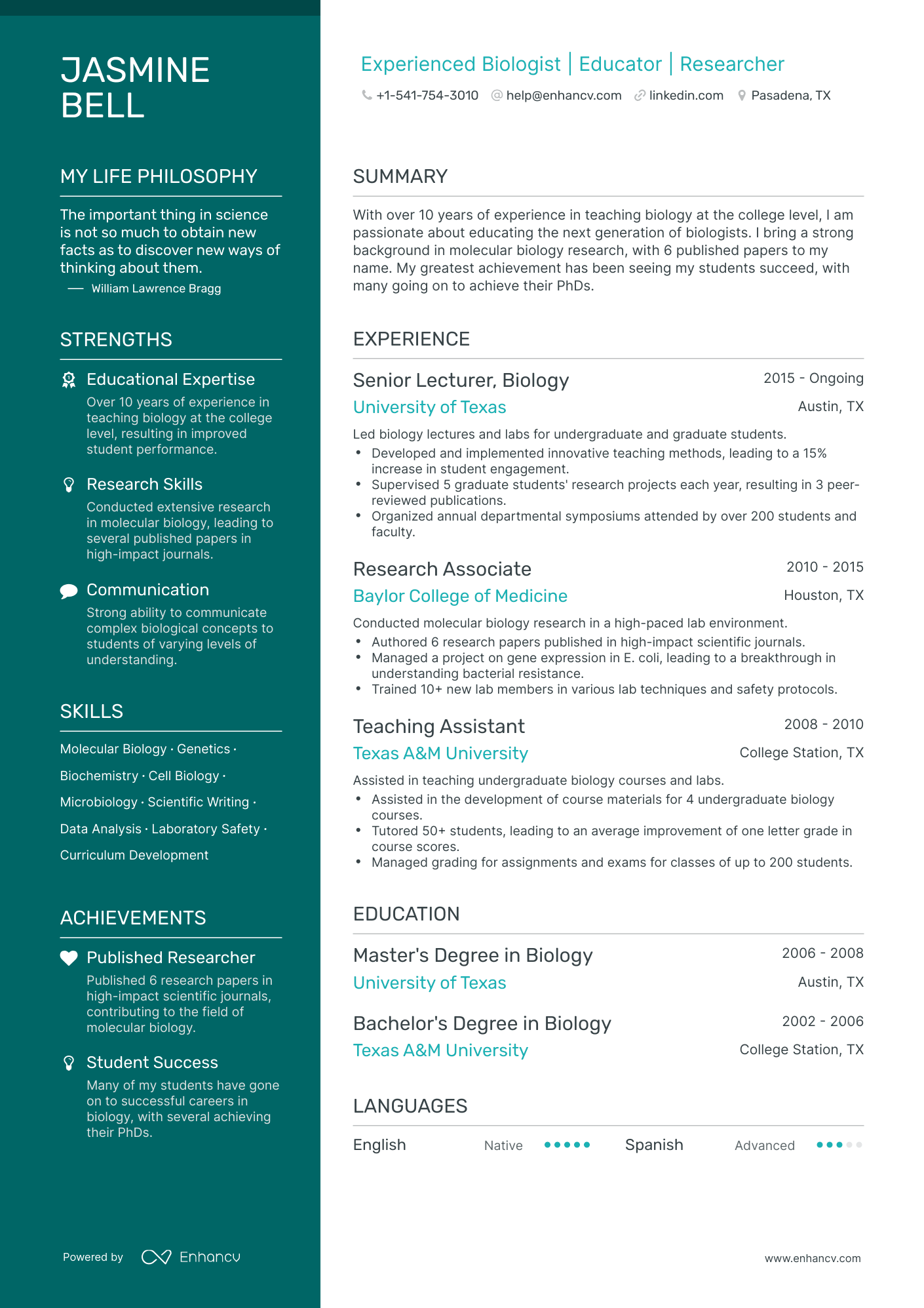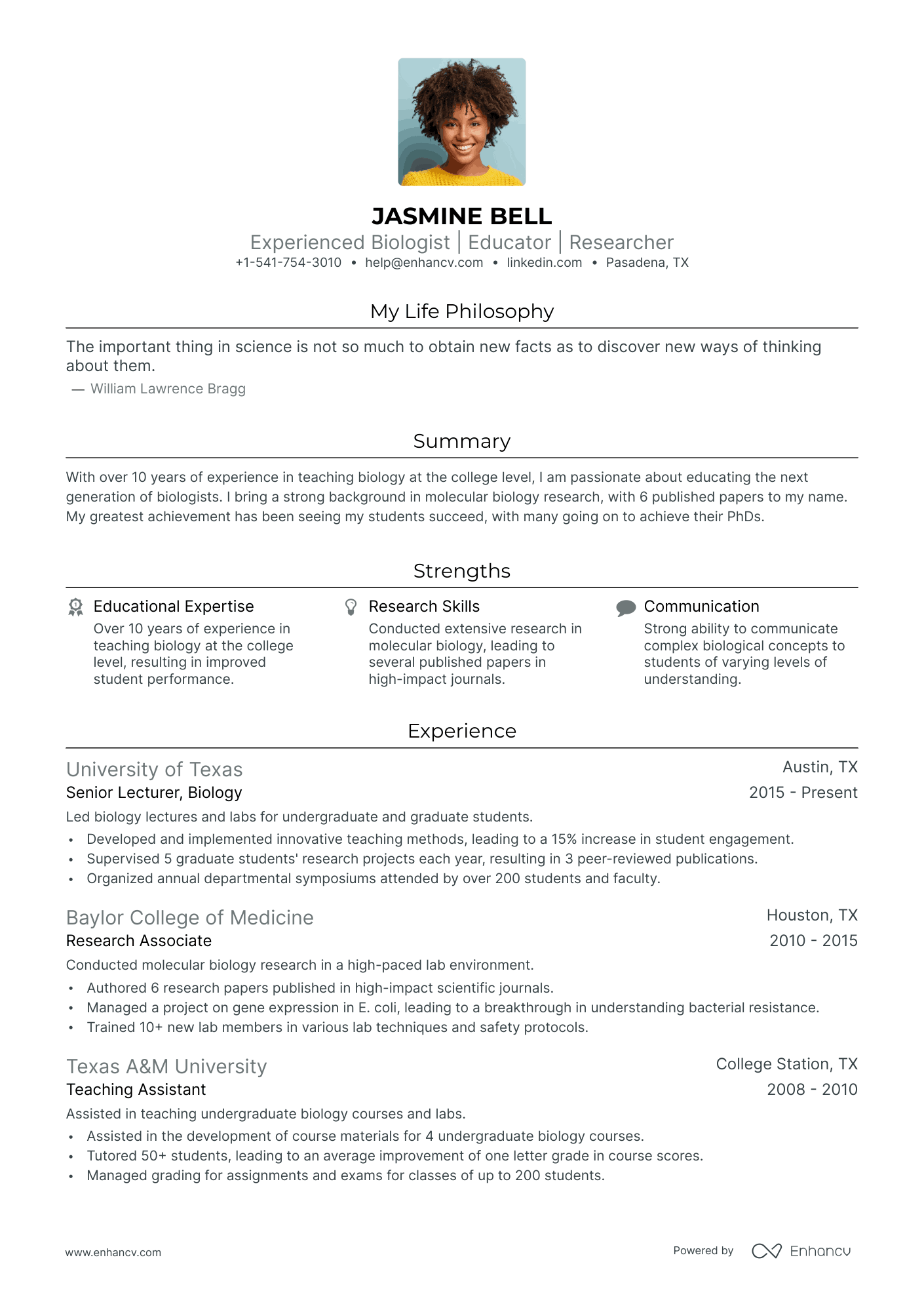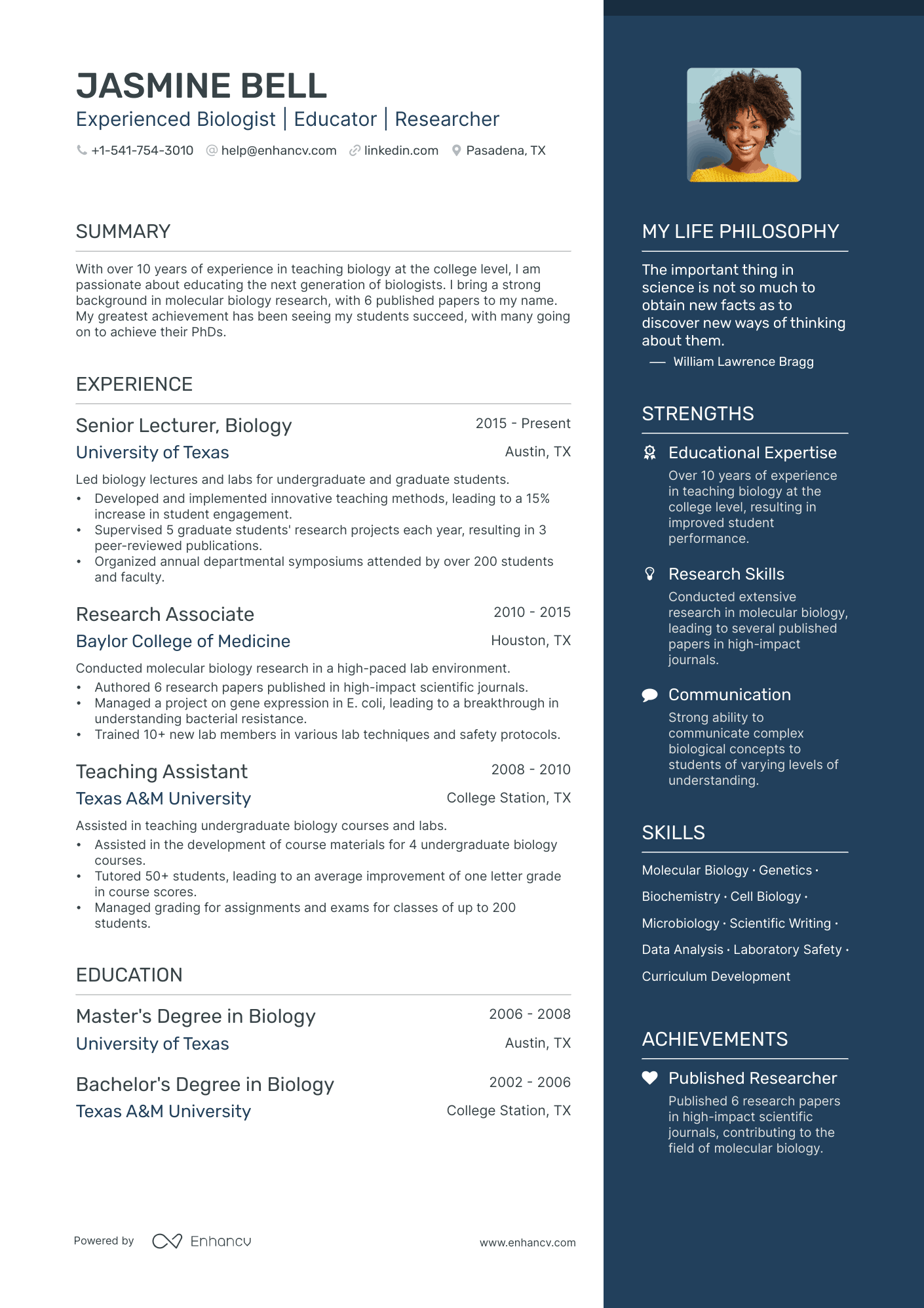Writing a compelling biology resume in 2026 comes with its own set of challenges. Biology job seekers face unique hurdles beyond the requirements for scientific knowledge and industry-relevant skills.
Ethical dilemmas in research, limited funding opportunities, and the rapid pace of technological advancements can make landing a job even more daunting.
You find yourself in a harsh environment. However, with careful planning, research, and attention to detail, you can cultivate a biologist resume that will help you thrive in this competitive job market.
In this guide, we will teach you how to write a resume that gets you calls for job interviews.
Key takeaways
- Use a reverse-chronological format and single-column layout for traditional roles in biology.
- Opt for a two-column layout for modern industry positions to maximize readability and efficiency.
- Write a comprehensive education section, describe coursework and projects relevant to the position.
- Prioritize a certifications section for roles in biotech or laboratory environments to signal your readiness for industry demands.
- Detail your conservation efforts or ecological studies to show practical experience and intrinsic motivation when applying for fieldwork roles.
We’ll start with an example to inspire you. You can copy and customize it in Ehancv’s AI-powered resume builder.
Biology resume sample
What we have here is a simple text-only resume of a research scientist. Take the time to examine how we’ve structured and written it.
Dr. Emily Carter
Research Scientist
(555) 143-85XX | emily.carter@enhancv.com | @LinkedIn | San Diego, CA
Summary
Experienced Research Associate with expertise in molecular biology and bioinformatics. Proficient in designing experiments, analyzing complex datasets, and collaborating with cross-functional teams. Adept at using tools like PCR and CRISPR to drive innovative solutions. Published author recognized for advancing genomic research through effective data visualization and impactful presentations.
Experience
Research Associate
Molecular Insights Lab, San Diego, CA
January 2022 – Present
- Designed and executed molecular biology experiments, including PCR and CRISPR workflows, contributing to the identification of three novel gene pathways.
- Analyzed and interpreted complex datasets using bioinformatics tools and statistical software (R, Python), reducing analysis time by 20%.
- Collaborated with interdisciplinary teams to develop genomic solutions, enhancing project outcomes and innovation.
- Authored and presented findings at two international conferences, receiving accolades for data visualization techniques.
- Ensured laboratory compliance with safety protocols, maintaining a zero-incident record.
Education
Ph.D. in Molecular Biology
University of California, San Diego, 2021
Bachelor of Science in Biology
University of Washington, 2016
Skills
- Molecular biology techniques (PCR, CRISPR, gel electrophoresis)
- Bioinformatics tools (BLAST, Galaxy)
- Statistical software (R, Python)
- Data visualization and interpretation
- Cross-functional team collaboration
Certifications
- Applied Bioinformatics Certificate
- Good Laboratory Practice (GLP) Certification
This resume is decent. But rest assured, we can do a lot better. Ready for some insider knowledge from the experts?
How to format a biology resume
Let’s start with formatting your biology resume appropriately. It’s safe to assume you want to convey professionalism while making your skills and core competencies easy to spot.
The best resume format for a biologist resume
A reverse-chronological resume is the best option for academic and research roles. This way hiring managers can easily scan through your most recent and relevant experience first.
If you’re applying for a traditional role (research scientist, wildlife biologist, microbiologist, etc.), keep things simple and focused with a single-column resume layout.
One-page resumes are appreciated in 2026 but you can confidently extend yours to two pages if you have over a decade of experience.
However, if you’re applying for a modern industry role (e.g., bioinformatics specialist, biotechnology product manager, environmental data analyst, etc.), we recommend you choose a one-page two-column format to optimize space and convey efficiency.
It’ll keep your document focused and actively engage the recruiters’ attention without distracting them with fluff.
Either way, consider the following:
Resume design tips
- Set resume margins between 0.5" and 1" for a neat look.
- Opt for simple, legible fonts like Arial or Calibri.
- Keep font sizes between 10-12 points for the body and 14-16 points for headings.
- Stick to black text on a white background.
- You can use subtle resume colors to accentuate headers and important information.
- Save time on these details with Enhancv’s ready-made templates.
Modern applicant tracking systems (ATS) use AI to read documents. This means you can use creative resume designs without worrying about ATS compatibility. Instead, focus on resume structure, accurate spelling, and relevant keywords.
Contact information
- Provide your name, phone number, professional email address, and your LinkedIn profile in your resume header.
- You can also include your city and state, but a full address is unnecessary. Adding a photo can cause unfavorable bias, so skip it.
- If applying for conservation or field roles, state your willingness to travel or work in remote locations.
File format and naming
- Save your resume in PDF to preserve formatting and ensure compatibility across devices.
- Use a clear, professional file name (e.g., Emily_Carter_Research_Scientist_Resume.pdf).
- Avoid using special characters or overly long file names.
Top sections to include in a biologist resume
- Contact Information
- Resume Summary or Objective
- Work Experience
- Education
- Skills
- Certifications
- Projects (if applicable)
Already have a resume? Give our AI-powered resume checker a try!
Is your resume good enough?
Drop your resume here or choose a file. PDF & DOCX only. Max 2MB file size.
Proper resume formatting is just a common courtesy. However, in a STEM field like biology, the deciding factor for getting a call from a hiring manager is your resume work experience section.
How to write your biology resume experience
You should really take your time when writing your biology resume experience. This is where you demonstrate how you’ve made an impact in your previous roles.
Follow these tips to present your experience effectively:
- Each work experience description should include your job title, company name and profile, location, and employment period.
- Follow a reverse-chronological order starting with your most recent or current job.
- If a particular experience entry is more relevant to the role, then place it on top of all other entries even if it isn’t the most recent.
- Tailor your resume to the role by listing relevant accomplishments and metrics rather than duties.
Don’t underestimate the effectiveness of resume tailoring. It’s one of the best ways to make your experience more compelling.
Here’s what it does for you:
- Enriches your resume with relevant keywords and makes it ATS-friendly.
- Conveys to hiring managers you’re a goal-oriented professional.
- Demonstrates alignment with the needs of the organization.
To give you a better example of this approach, let’s do a little exercise. We’ll go over an example job description and adapt an experience entry to it.
Research Scientist
Company Profile:
BioInnovate Inc. is a cutting-edge biotechnology firm dedicated to advancing scientific discovery through innovative research and technology. Our mission is to improve healthcare and environmental sustainability by developing groundbreaking solutions in molecular biology, genomics, and bioinformatics.
Responsibilities:
- Design and execute experiments to support research and development initiatives in molecular biology and genomics.
- Analyze and interpret complex datasets, utilizing bioinformatics tools and statistical software.
- Collaborate with cross-functional teams, including bioinformaticians, engineers, and product managers, to develop innovative solutions.
- Prepare and present findings through technical reports, presentations, and peer-reviewed publications.
- Maintain laboratory compliance with safety protocols and quality standards.
- Stay current with advancements in the field by reviewing scientific literature and attending conferences.
Requirements:
- Master’s or Ph.D. in Molecular Biology, Biotechnology, Bioinformatics, or a related field.
- Proficiency in molecular biology techniques, such as PCR, CRISPR, and gel electrophoresis.
- Experience in bioinformatics, including genome assembly, annotation, and data visualization.
- Strong analytical and problem-solving skills with expertise in statistical analysis tools like R or Python.
- Excellent communication and teamwork abilities.
For easy reference, we’ve highlighted key parts of the job description. Now we’re going to target them with our experience entry by using almost the exact same terms.
- •Designed and executed advanced molecular biology experiments, including PCR and CRISPR workflows, contributing to the successful identification of three novel gene pathways.
- •Analyzed and interpreted datasets using bioinformatics tools and statistical software (R, Python), achieving a 20% reduction in analysis time.
- •Collaborated with interdisciplinary teams to develop genomic solutions, enhancing project outcomes through effective cross-functional communication.
- •Authored and presented findings at two international conferences, receiving recognition for innovative data visualization techniques.
- •Ensured laboratory compliance with safety protocols, resulting in zero incidents during tenure.
If you’ve been diligent with keeping track of metrics in your work, then you’ll find the next section particularly helpful.
How to quantify your experience on а resume
Nobody can argue with precise numbers—they make your achievements tangible. You’ll get closer to job interviews if you present your accomplishments with specific examples like these:
- Reduced analysis time by 25% across 300 genomic samples by optimizing bioinformatics workflows.
- Processed over 1,200 biological samples within a six-month period to support high-throughput sequencing projects.
- Contributed to securing $500,000 in research funding by developing grant proposals and presenting key findings.
- Published four peer-reviewed articles and delivered three presentations at international conferences to share groundbreaking research.
- Identified three novel gene pathways through 200+ molecular biology experiments, directly impacting therapeutic developments.
Having experience is a huge advantage when applying for a biology role. But if you lack it, then you’ll find the next section helpful.
How to write a biology resume with no experience
You can create a compelling biology resume without experience by leveraging your strengths. And the best way to do that is with a functional or a hybrid format.
A functional resume focuses on skills and relevant accomplishments rather than work history. A hybrid resume uses elements of both functional and reverse-chronological formats
These resume types are perfect for biologists who don’t have direct experience or are recent graduates.
Here’s what you should include in yours:
- Place your education section before any experience.
- Detail your coursework, lab work, or independent projects that got you transferable experience.
- Have a comprehensive skills section and describe how you acquired the listed abilities.
- Add volunteer roles, internships, or assistantships that align with the role you’re targeting.
Take the time to carefully tailor all the information to the role just as we showed you in the previous section. Then move on to write a strong resume objective.
Objective writing tips
Since you lack direct experience, it’s essential to convey your strong motivation to secure the position. The best place to emphasize this is in your objective statement.
Here’s what to include:
- Specific technical skills that align with the job requirements.
- A clear reference to the company’s mission or research focus.
- A unique academic achievement or research project that sets you apart.
- Action verbs to demonstrate enthusiasm, such as "eager to apply" or "dedicated to advancing.”
Here’s an example for someone applying for an entry-level marine biologist role:
Any resume benefits from having a detailed skills section but let’s see if there’s anything peculiar when it comes to roles in biology.
Optimize your resume summary and objective for ATS
Drop your resume here or choose a file.
PDF & DOCX only. Max 2MB file size.
How to list your hard and soft skills on your resume
Listing your skills might seem straightforward, but there are best practices to keep in mind. For any biology role, you should have a dedicated hard skills section.
Hard skills are job-specific technical abilities acquired through education and training. Soft skills are interpersonal attributes that influence how you interact with your coworkers.
You can go beyond typical resume writing lingo by naming the section “Technical Expertise” to boost your credibility.
However, exaggerating your professional capabilities—or outright lying on your resume—is strongly discouraged, as technical skills are easy to measure and test.
In 2026, here’s what hiring managers and ATS systems are focusing on in biology resumes:
Best hard skills for your biology resume
- PCR (Polymerase Chain Reaction)
- CRISPR-Cas9
- Next-Generation Sequencing (NGS)
- Flow Cytometry
- Spectrophotometry
- High-Performance Liquid Chromatography (HPLC)
- Mass Spectrometry
- Bioinformatics Tools (e.g., BLAST, Galaxy)
- Microscopy (e.g., Confocal, Electron)
- DNA Sequencing
- RNA-Seq Analysis
- ELISA (Enzyme-Linked Immunosorbent Assay)
- Genomic Assembly and Annotation
- Geographic Information Systems (GIS)
- Western Blotting
- Immunohistochemistry
- Data Analysis Software (e.g., R, Python)
- Environmental Sampling Tools
- Proteomics Analysis
- Gel Electrophoresis
Soft skills certainly matter for a biologist—for example, when collaborating with your peers—but hiring managers typically assess interpersonal qualities more thoroughly during the interview phase so there’s no need for a separate section, as it can detract from your technical qualifications.
Instead, you can describe your soft skills through your work experience and accomplishments as they work best on a resume when put in context.
Here’s what’s expected for most biology roles in 2026:
Best soft skills for your biology resume
Now that you’ve outlined your skills, it’s time to highlight your educational background which is paramount in the field of biology.
How to list your certifications and education on your resume
Academic rigor is highly valued in the field of biology. An extensive educational background is often a deciding factor for many roles because it lays the foundation of your scientific knowledge.
Therefore, for roles such as research scientist, wildlife biologist, or university lecturer, education should take priority over certifications because hiring managers will be more interested in your degree.
Here’s how to structure your education section:
- Degree in biology
- School or institution name
- Graduation year
- GPA score (optional, if over 3.5)
- Relevant coursework or projects (optional)
For example, if you are applying for a wildlife biologist role, then your education section should look something like this:
- •Conducted a thesis project on habitat restoration techniques, leading to a 15% increase in biodiversity in the study area.
- •Collaborated on a field study monitoring endangered species populations across a 50-square-mile region.
- •Published a peer-reviewed paper on the impact of climate change on migratory bird patterns in North America.
- •Developed GIS maps to analyze wildlife corridors, aiding conservation planning initiatives.
- •Recipient of the Dean's Award for Excellence in Environmental Research.
- •Graduated with Honors for outstanding contributions to ecological field studies.
However, for certain roles where specific technical expertise is crucial, it makes sense to lead with your certification section.
Simply list the name of the certificate, the year you obtained it, and the issuing organization.
Here’s an example:
From what we’ve assessed, these are the top five biology certifications that recruiters prioritize in 2026:
Best certifications for your biology resume
There’s one more vital resume component we must examine. One might say it’s the “nucleus” of your application.
How to write your biology resume summary
A lot goes into writing a good biology resume summary. It’s the central statement where your education, experience, accomplishments, and motivation come together to demonstrate what makes you the best candidate for the role.
Here are some best practices to consider:
- Start with your years of experience or education level.
- Highlight key technical skills relevant to the job.
- Quantify achievements by using numbers.
- Tailor the summary by referencing the company’s mission or focus.
- Briefly mention your career goals to align with the role.
Here’s an example to inspire you:
This example resume summary is well-rounded. The applicant states their ability to design educational programs and manage lab activities, along with success in creating interactive learning environments.
Furthermore, it aligns closely with the role requirements, improving ATS compatibility and capturing the attention of hiring managers.
Speaking of a compelling application, is there anything else you could add to your resume to make yourself an even stronger candidate for the role?
Additional sections for a biology resume
Now that we’ve covered the essential resume sections, you can further tailor your resume to the role by including strategic additional components
Here are some examples:
- Volunteer Work: Highlights transferable experience and intrinsic motivation.
- Publications and Presentations: Ideal for research and industry roles.
- Grants and Funding: Highly valued in senior-level positions.
- Awards and Recognitions: Enhances academic applications.
- Fieldwork and Research Projects: Crucial for roles in ecology, wildlife biology, and environmental science.
In conclusion
As you can see, writing an attention-grabbing biology resume isn’t as complex as mapping out a genome. It simply requires presenting your expertise and skills with the right resume structure and attention to detail.





